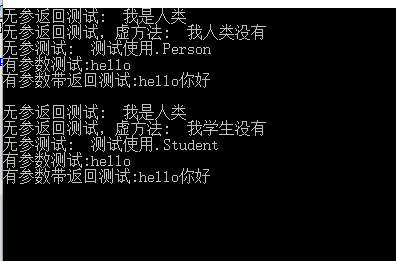都是为了获取类的引用的数据类型System.Type。
1、GetType()方法继承自Object,所以C#中任何对象都具有GetType()方法,x.GetType(),其中x为变量名
2、typeof(x)中的x,必须是具体的类名、类型名称等,不可以是变量名称
3、System.Type.GetType(),有两个重载方法
比如有这样一个变量i:
Int16 i = new Int16();
使用GetType(),i.GetType()返回值是Int16的类型,但是无法使用typeof(i),因为i是一个变量,
使用typeof(),则只能:typeof(Int32),返回的同样是Int16的类型。
枚举类的转换,String——枚举类,以串口中Parity为例
objParity= (Parity)Enum.Parse(typeof(Parity), "9600");
获取类的Type属性,除了上面的使用实例获取,或者typeof,还有一种提供类的完整信息字符串,根据类名来获取Type
//取得当前方法命名空间
str += "命名空间名:" + System.Reflection.MethodBase.GetCurrentMethod().DeclaringType.Namespace + "\n";
//取得当前方法类全名 包括命名空间
str += "类名:" + System.Reflection.MethodBase.GetCurrentMethod().DeclaringType.FullName + "\n";
//取得当前方法名
str += "方法名:" + System.Reflection.MethodBase.GetCurrentMethod().Name + "\n"; str += "\n";
//取得当前方法类全名 包括命名空间
string classname = System.Reflection.MethodBase.GetCurrentMethod().DeclaringType.FullName; //得到的是 命名空间.类
Type type = Type.GetType(classname); // 通过类名获取同名类
object obj = System.Activator.CreateInstance(type); // 创建实例
连上- 通过方法名调用方法
public class Person //类A,父类 { public string My() //不带参数,有返回 { return "我是人类"; } public virtual string num() //不带参数,有返回,虚方法子类测试 { return "我人类没有"; } public void Myvoid() //不带参数,无返回 { Console.WriteLine("无参测试:"+" "+Myclass()); } public void Myvoid(string name) //带参数,无返回 { Console.WriteLine("有参数测试:" +name) ; } public string Myvoid(string name,string name1) //带参数,有返回 { Console.WriteLine("有参数带返回测试:" + name + name1); return name + name1; } public virtual string Myclass() //虚方法返回类名,子类测试 { return System.Reflection.MethodBase.GetCurrentMethod().DeclaringType.FullName; }//得到的是 命名空间.类名,返回该类的 名字 } public class Student:Person { public override string Myclass() { return System.Reflection.MethodBase.GetCurrentMethod().DeclaringType.FullName; }//得到的是 命名空间.类名,返回该类的 名字 public override string num() { return "我学生没有"; } } private void Main() { //父类测试 Person objperson = new Person();//实例person类 string classname = objperson.Myclass(); Type type = Type.GetType(classname); // 通过类名获取类的type类型 //Type type = objperson.GetType(); // 通过实例对象 获取类的type类型 object obj = System.Activator.CreateInstance(type); // 创建实例 string strMethod = "My"; //方法名字 System.Reflection.MethodInfo method = type.GetMethod(strMethod, new Type[] { }); // 获取方法信息 object[] parameters = null; //无参数 string result = (string)method.Invoke(obj, parameters); // 调用方法,无参数,有返回值 Console.WriteLine("无参返回测试:" + " " + result); strMethod = "num"; //方法名字 method = type.GetMethod(strMethod, new Type[] { }); // 获取方法信息 parameters = null; //无参数 result = (string)method.Invoke(obj, parameters); // 调用方法,无参数,无返回值 Console.WriteLine("无参返回测试,虚方法:" + " " + result); strMethod = "Myvoid"; //方法名字 method = type.GetMethod(strMethod, new Type[] { }); // 获取方法信息 parameters = null; //无参数 method.Invoke(obj, parameters); // 调用方法,无参数,无返回值 strMethod = "Myvoid"; //方法名字 method = type.GetMethod(strMethod, new Type[] { typeof(string) }); // 获取方法信息带一个参数 parameters = new object[] { "hello" }; //一个参数 method.Invoke(obj, parameters); // 调用方法,有参数,无返回值 strMethod = "Myvoid"; //方法名字 method = type.GetMethod(strMethod, new Type[] { typeof(string), typeof(string) }); // 获取方法信息带两个参数 parameters = new object[] { "hello", "你好" }; //两个参数 method.Invoke(obj, parameters); // 调用方法,有参数,有返回值 //子类测试 Person objstudent = new Student();//实例person类 string classname = objstudent.Myclass(); Type type = Type.GetType(classname); // 通过类名获取类的type类型 //Type type = objstudent.GetType(); // 通过实例对象 获取类的type类型 object obj = System.Activator.CreateInstance(type); // 创建实例 string strMethod = "My"; //方法名字 System.Reflection.MethodInfo method = type.GetMethod(strMethod, new Type[] { }); // 获取方法信息 object[] parameters = null; //无参数 string result = (string)method.Invoke(obj, parameters); // 调用方法,无参数,有返回值 Console.WriteLine("无参返回测试:" + " " + result); strMethod = "num"; //方法名字 method = type.GetMethod(strMethod, new Type[] { }); // 获取方法信息 parameters = null; //无参数 result = (string)method.Invoke(obj, parameters); // 调用方法,无参数,无返回值 Console.WriteLine("无参返回测试,虚方法:" + " " + result); strMethod = "Myvoid"; //方法名字 method = type.GetMethod(strMethod, new Type[] { }); // 获取方法信息 parameters = null; //无参数 method.Invoke(obj, parameters); // 调用方法,无参数,无返回值 strMethod = "Myvoid"; //方法名字 method = type.GetMethod(strMethod, new Type[] { typeof(string) }); // 获取方法信息带一个参数 parameters = new object[] { "hello" }; //一个参数 method.Invoke(obj, parameters); // 调用方法,有参数,无返回值 strMethod = "Myvoid"; //方法名字 method = type.GetMethod(strMethod, new Type[] { typeof(string), typeof(string) }); // 获取方法信息带两个参数 parameters = new object[] { "hello", "你好" }; //两个参数 method.Invoke(obj, parameters); // 调用方法,有参数,有返回值 }
结果显示:

Object对象转为实体类对象
private T ConvertObject<T>(object asObject) where T : new() { //创建实体对象实例 var t = Activator.CreateInstance<T>(); if (asObject != null) { Type type = asObject.GetType(); //遍历实体对象属性 foreach (var info in typeof(T).GetProperties()) { object obj = null; //取得object对象中此属性的值 var val = type.GetProperty(info.Name)?.GetValue(asObject); if (val != null) { //非泛型 if (!info.PropertyType.IsGenericType) obj = Convert.ChangeType(val, info.PropertyType); else//泛型Nullable<> { Type genericTypeDefinition = info.PropertyType.GetGenericTypeDefinition(); if (genericTypeDefinition == typeof(Nullable<>)) { obj = Convert.ChangeType(val, Nullable.GetUnderlyingType(info.PropertyType)); } else { obj = Convert.ChangeType(val, info.PropertyType); } } info.SetValue(t, obj, null); } } } return t; }


 浙公网安备 33010602011771号
浙公网安备 33010602011771号